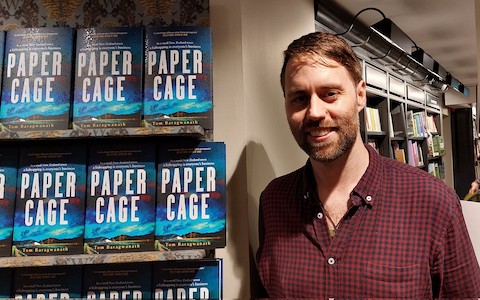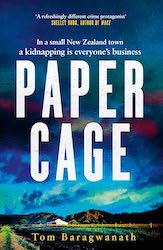
Originally from Masterton, in the Wairarapa region of New Zealand’s North Island, Tom Baragwanath is a Kiwi writer currently living in Paris. His short fiction has been widely published. Tom’s debut novel Paper Cage, a small-town thriller about a police records clerk who gets involved in an investigation into missing children, won the 2021 Michael Gifkins prize for unpublished manuscripts. After its publication in Australia and New Zealand it became a finalist for the 2023 Ngaio Marsh Award for Best First Novel and was shortlisted for the 2023 Ned Kelly Award for Best International Crime Fiction.
Earlier in 2024 Paper Cage was published in hardcover in the UK by Baskerville, and hardcover in the USA by Knopf. Between pastries, Tom is working on his next novel.
Your debut Paper Cage is set and deeply rooted in the Wairarapa region of New Zealand where you grew up, yet you wrote the book while you've been living in Europe; was it a sense of homesickness that sparked the novel's setting? How did the feeling of distance give you an outsider/insider viewpoint on the place?
There was absolutely a sense of homesickness behind my initial choice for the setting, for sure. I’d been trying out a few ideas for longer stories set in Paris, and I just felt like my grasp on the place wasn’t quite firm enough – but then the pandemic lockdown threw everything sideways anyway. I found myself wondering daily what was happening back home with my loved ones, and all of this ended up pouring into Paper Cage.
On the question of distance, being so far away has definitely helped me to write about the Wairarapa in general, and Masterton specifically. I’m writing about the nuances of small-town claustrophobia and mutual surveillance, so it helps in a sense to be somewhere else thinking back on it.
Lorraine Henry is an atypical sleuth or crime fiction heroine: where did she come from and what made you want to centre your tale around her?
It’s always a pleasure to hear that, thanks! Lorraine is an amalgam of quite a few people who have been (and are still) very dear to me, but I won’t name them because they’ll get annoyed – and quite rightly. Beyond any real-life inspiration, I wanted to explore what David Foster Wallace terms ‘the heroism of boredom’ in his posthumous novel The Pale King about (among many, many other things) the US tax office. Essentially, the world turns on a vast number of underappreciated people doing very important, deeply dull work – like maintaining a records department in a small-town police station. I wanted to put that in the spotlight, and try to draw attention to all the invisible labour – performed in the vast majority of cases by women – that keeps things ticking over.
New Zealand crime fiction seems to be going through something of a mini-boom in recent years, with several authors being published internationally and being shortlisted for or winning awards. What's your take on the rise of New Zealand crime writing in general, or the international audience appetite for stories from places far afield?
It’s wonderful, isn’t it? I think it reflects the international audience’s thirst for stories that have something new to say, and a lot of that comes through exploring new locales, and new forms of storytelling. On a more practical level, it’s possible a once-in-a-lifetime pandemic gave readers a renewed sense of curiosity about countries and places they might not have read about – almost a spillover from tourism to literature.
What have you been reading lately/what are some of your favourite crime, thriller or mystery books of recent years?
Lately I’ve been in a big Milan Kundera mood – I’ve just finished his novel Life is Elsewhere, and re-read The Joke before that. There’s this incredible sense of humour and levity in his style, and his ability to balance philosophy and pragmatism in his tone is phenomenal. And with the news of Alice Munro’s passing this week, it’s high time for me to return to her short stories. In terms of crime and mystery, I had the great fortune (for my soul, not my liver) to meet the writer SA Cosby at Harrogate last year, and I absolutely inhaled his novel All the Sinners Bleed. It’s wonderful stuff. Gary Disher’s latest novel Sanctuary was fantastic too.
How did you hear about the Michael Gifkins Prize, what inspired or prompted you to enter, and what impact has it had on your writing career?
I first heard about the Michael Gifkins Prize through the NZ Society of Authors/Te Puni Kaituhi o Aotearoa – they offer an indispensable summary of prize, grant, and mentorship opportunities for members. Winning the prize has had an incalculable impact for me – without it I’d likely still be scratching around with my stories and wondering if I was on to something. Instead, I get to log in on GoodReads and see all the lovely readers around the world wondering what the hell Cameo Cremes are. (Biscuits. They’re biscuits).
Can you tell us how as a Kiwi from a smalltown in New Zealand you ended up in Paris, what your daily life is like there, and what impact Paris has on your writing?
My wife and I moved her on something of a whim, and now it’s been nearly six years. In terms of daily life, we’re both juggling day jobs, a baby, and a fortuitously low-maintenance dog. Our daily lives are a blend of pastries and metro strikes, with the occasional week playing tour guide when people visit, which is always excellent. The biggest impact Paris has had on my writing is that people take the idea of being a writer here quite seriously, which is encouraging. If I ever mention to someone here that I have a novel out, they’re usually more curious than suspicious. Nobody ever asks, ‘okay, but what do you do to pay the rent?’ Or if they do ask, it’s in French, so I understand half the words.
What are you working on now - a second Lorraine Henry novel, or something else? What can you tell us about what we may see next from Tom Baragwanath?
At the moment, I’m working on a new Lorraine Henry story. It’s a real delight to be spending time in the file room with her again, and I only hope I can bring some of that delight to the page, too.
Paper Cage by Tom Baragwanath out now in hardback (Baskerville, Feb 2024)
